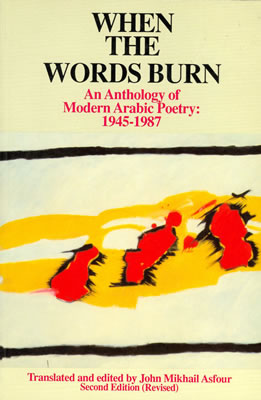BOOKS IN REVIEW
MIDDLE-EASTERN VOICES
MARWAN HASSAN, The Confusion of Stones:
Two Novellas. Cormorant, n.p.
 JOHN MIKHAIL ASFOUR, ed. & tr., When the Words Burn: An Anthology of Modern Arabic Poetry: ig^.5-ig8y. Cormorant, n.p.
JOHN MIKHAIL ASFOUR, ed. & tr., When the Words Burn: An Anthology of Modern Arabic Poetry: ig^.5-ig8y. Cormorant, n.p.
MARWAN HASSAN’S TWO NOVELLAS mark a new chapter in the Canadian volume of immigration. They chronicle the Manichaean world of Canadians of Lebanese origin : the heroes are torn between their emotional and spiritual attachment to the soil of Southern Lebanon and the compulsions of survival and adjustment in the new Canadian terrain. Juxtaposing images of folkloric Islamic motifs, using flashbacks, and deploying dream-withdream, Hassan registers his characters’ sense of nostalgia and dislocation. In the first novella, “The Confusion of Stones,” he dramatizes vividly violent scenes of chaos and carnage created by constant Israeli bombing of the South. Despite its angry, tortured tone, the narrative succeeds in engaging its reader in the tribulations of a destitute Lebanese peasant victimized by the almightly bombers. Out of this suffering, Canada looms as a sanctuary.
However, getting there is not easy for the hero, Falah Azlam, especially when he has his right hand handicapped and deformed by bombing; his cynical cousin explains to him the shenanigans of immigration officialdom: “With all the newspapers in Canada telling bad news about the Muslims, you would not have a chance. … A refugee in your own country, nobody [sic] wants you.” Landing eventually in Canada brings, ironically, numerous disappointments: Az-lam finds that his sponsoring uncle has devolved from a generous, genial gentleman to a dour, penny-pinching hack, who, bitter and disillusioned, has lost faith in all. Anxious to establish his roots, the hero finds the terrain unwelcoming, the culture cold emotionally, and the people indifferent: stones (recurrently deployed in the narrative) become apt metaphors. Happily, the novella ends with daffodils of hope.
This neat suggestive conclusion to Hassan’s first novella is not to be found in the confusing ending of his second one “Intelligence.” The hero, Salah Abourezk, a physician who makes the reverse journey back to the South of Lebanon to reconnect with relatives and who survives an intimidating interrogation by two G.I.A.-trained operatives, finds himself on his return to Canada accused of drug-trafficking by a foul-mouthed, sexist narcotics officer. Such a closure seems more contrived than convincing; the author’s intent is to draw a parallel between the aggressiveness of intelligence officers in Lebanon and the vulgarity of the Canadian drug officer. Callous and corrupt, power abusers everywhere are all alike, so suggests Hassan. This corruption creates and causes deformity, recurrently symbolized as physical, moral or political : a deformed hand microcosms a country dismembered by a civil war; a society cheapened by an acquisitive drive runs the risk of moral bankruptcy.
When the Words Burn is a solid scholarly work of translation, prefaced by a thorough 6o-page introduction covering over forty years of progress in modern Arabic poetry. John Mikhail Asfour anthologizes major, representative works by thirty-five Arab poets: his accomplishment manifests patience, dedication and a clear control of the task undertaken. His introduction is quite informative, if at times a bit too technical, and his synoptic introduction to the individual poets most useful. Above all, I find the translations quite sensitively rendered, preserving (as much as translations do) the poets’ distinctive voices. Since Asfour uses the term “modernism” quite often with reference to the innovations in modern and contemporary Arabic poetry, and given the definition debates that this term engenders, I only wish that he has provided his readers in English with illuminating signifiers to compare and distinguish the Arabic “modernism” in poetry from the European “modernism/s” that variably cover numerous genres. More importantly, the section on Palestinian resistance poetry is definitely a valuable service to Canadian readers : indeed, touching and engaging is the poetry that expresses an attachment to a homeland and an aching for justice. In fact, the indelible conclusion one derives from an anthology with such a striking title is that poetry and politics are inextricably intertwined in the Arab world : innovation in poetry stems from the spirit to dismantle rigid, restrictive, albeit venerated, forms of classical poetry ; this rebelliousness matches the poet’s conscious commitment to espouse and express social causes. Is it any wonder, then, that the poets who resist or refuse being eulogizing lackeys for tyrants face starvation, jail, torture, or exile? A few have actually been assassinated, and one, the Lebanese Khalil Hawi, committed suicide two days after the Israeli invasion of his country. If I were to criticize the format of these two otherwise elegantly-designed books, I would certainly mention the poor editing : granted that the two books contain numerous Arabic words, yet the large number of typographical and grammatical errors are too many to be ignored. (The one recurrent irritant is the inconsistent spelling switch between “Moslem” and “Muslim”; this is a common colonial confusion : the correct spelling is the latter. ) Despite these eyesores, I find it quite insightful and inspiring to see Cormorant Books, still a fledgling Canadian concern, undertake the publication of these two books. I sincerely hope that it shall continue launching similar projects: new voices, expressing the depth and diversity of the Canadian family, are always eager to be heard.
AMIN MALAK

One response to “Book Review of When the Words Burn”
[…] a practice he maintained while attending to his own writing. At McGill he began work on When the Words Burn: An Anthology of Modern Arabic Poetry (Cormorant Books, 1988, 1992; American University, 1992, Cairo, and University of Ankara,1994) […]